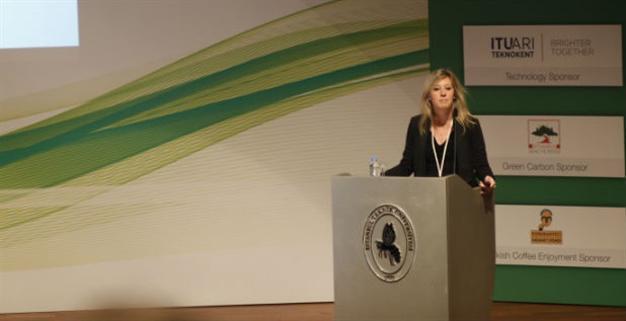Turkey needs transparent monitoring, emissions reporting: IETA
Öykü Altuntaş - Doğan News Agency

Reliable and transparent monitoring and emissions reporting are “step one” for an emerging carbon market, European Union Policy Director at International Emissions Trading Association Sarah Deblock said as she discussed the country’s road map in energy transition within COP21 objectives.
“You need to set a robust framework and rules that businesses can rely on. Transparent, clear accounts, monitoring and independent verification are needed for developing a carbon market,” Deblock told Doğan News Agency at the third Carbon Summit in Istanbul.
Deblock also stressed the significant effect of instability on businesses.
“If the political environment or political party changes, incentives can change, which is harmful for investments,” she said.
“The cap and trade system, which is neutral, lets the market to design in terms of what technologies to choose and is not political driven,” she said, referring to the principle developed by the EU Emissions Trading System (EU ETS). The cap and trade system sets an overall cap, or maximum amount of emissions per compliance period, for all sources under the program.
‘All sources can be seen, as long as it stays in the cap’
Renewable energy is mostly encouraged by various tools including special tax discounts, fiscal measures, and incentives in EU countries. Turkey, on the other hand, is criticized for its quickly increasing use of coal, according to Deblock.
Accordingly, she urged transitions to renewable energy within COP21 perspectives.
Answering a question about Turkey’s challenging trial with renewable energy and its increasing use of coal, Deblock said the Emissions Trading Association “avoid[s] the discussion of technologies to promote and prescribe [one] over another.”
“All sources can be seen as long as it stays in the cap; that is the environmental objective,” she added.
‘Coordination and balance needed if new measures introduced’
Deblock also pointed to the necessity of trust in rules for promoting renewable sources and investments in the country.
“If there is a political choice to invest and promote renewable sources in Turkey, you need trust in the system and framework with rules to rely on. If you start introducing new measures, you need coordination and balance, so you do not penalize the industry. National and political decisions can undermine the EU ETS,” Deblock said.
‘Too early to say’ if Turkey is open to the cap and trade system
According to Deblock, Turkey is an “interesting” case for carbon market measures and the cap and trade system, and it was “too early to say” if Turkish market is open to the system.
“Let’s see where the largest emissions come from. Can we develop transparent and reliable rules for monitoring and reporting of emissions? There is interest in developing a carbon market and Turkey is working with the World Bank within the project called the Partnership for Market Readiness,” she said.
According to the EU ETS rules, the cap should be fixed within the cap and trade mechanism.
However, European countries face problems as “domestic and national measures try to do more,” within the European wide cap allowances, Deblock said, noting that Germany had boosted environmental policies to phase out coal.
“While it is fine in the climate perspective, by reducing greenhouse gas emissions through means other than the EU ETS, you might contribute to the oversupply and undermine the price signal and the incentives of the trading system,” Deblock said.
What is cap and trade?
The EU ETS works on the “cap and trade” principle. A “cap,” or limit, is set on the total amount of certain greenhouse gases that can be emitted by factories, power plants and other installations in the system. The cap is reduced over time so that total emissions fall. Within the cap, companies receive or buy emission allowances which they can trade with one another as needed.
The EU ETS is considered a “cornerstone of the European Union’s policy to combat climate change,” to reduce industrial greenhouse gas emissions cost-effectively.
However, the EU ETS also faces “a challenge in the form of a growing surplus of allowances, largely because of the economic crisis, which has depressed emissions more than anticipated.”
 Reliable and transparent monitoring and emissions reporting are “step one” for an emerging carbon market, European Union Policy Director at International Emissions Trading Association Sarah Deblock said as she discussed the country’s road map in energy transition within COP21 objectives.
Reliable and transparent monitoring and emissions reporting are “step one” for an emerging carbon market, European Union Policy Director at International Emissions Trading Association Sarah Deblock said as she discussed the country’s road map in energy transition within COP21 objectives.